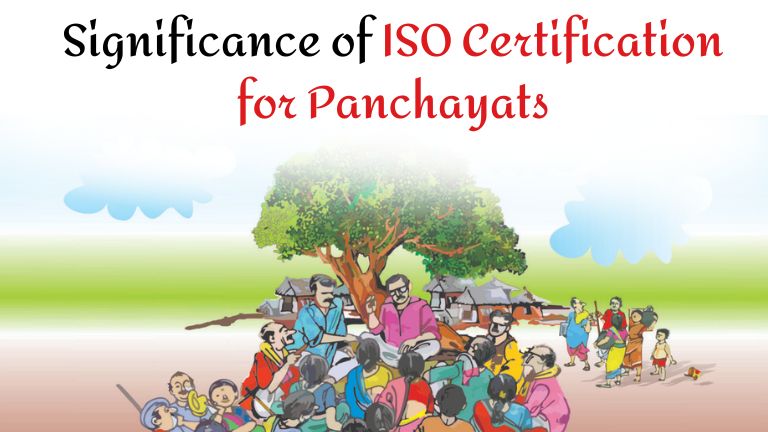In an era where transparency, efficiency, and accountability are
paramount, the role of ISO certification in strengthening governance structures
cannot be overstated. Panchayats, as the grassroots level of governance in
India, are pivotal in implementing government schemes, addressing local issues,
and fostering community development. ISO (International Organization for
Standardization) certification serves as a tool to enhance the operational
efficiency and service quality of these institutions. This article delves into
the importance, process, and benefits of ISO certification for Panchayats,
highlighting how it can drive transformative change.
Understanding ISO Certification
ISO certification is a globally recognized standard that establishes
benchmarks for quality management systems, environmental practices, information
security, and more. It provides a structured framework for organizations to
improve their processes, ensure compliance with international standards, and
achieve consistency in service delivery. For Panchayats, relevant ISO standards
include:
- ISO
9001: Quality Management Systems
- ISO
14001: Environmental Management Systems
- ISO
45001: Occupational Health and Safety Management Systems
- ISO
26000: Social Responsibility
By aligning with these standards, Panchayats can improve governance
mechanisms and ensure sustainable development at the grassroots level.
Significance of ISO Certification for Panchayats
Panchayats are the backbone of India’s rural administration. Their
effective functioning is essential for:
- Implementing
Welfare Schemes: Panchayats are responsible for executing
flagship programs like the Mahatma Gandhi National Rural Employment
Guarantee Act (MGNREGA), Swachh Bharat Mission, and rural housing schemes.
- Promoting
Local Development: They manage essential services such as water
supply, sanitation, and rural roads.
- Strengthening
Local Democracy: Panchayats empower citizens by involving them
in decision-making processes.
ISO certification provides a mechanism to ensure these responsibilities
are carried out efficiently and transparently, thereby increasing public trust
and satisfaction.
Benefits of ISO Certification for Panchayats
- Improved
Service Delivery ISO-certified Panchayats can establish
well-defined processes to provide consistent and timely services. This
reduces delays and ensures better utilization of resources.
- Enhanced
Accountability Certification promotes documentation and
monitoring of all activities. This ensures that officials are accountable
for their actions, leading to reduced instances of corruption and
mismanagement.
- Environmental
Sustainability ISO 14001 encourages Panchayats to adopt
eco-friendly practices in waste management, water conservation, and
pollution control, fostering sustainable development.
- Increased
Citizen Engagement Transparency in operations and participatory
decision-making processes, fostered through ISO standards, encourage
greater community involvement in governance.
- Capacity
Building The certification process involves training and capacity building
of Panchayat staff, equipping them with the skills to implement and
maintain international standards.
- Better
Funding Opportunities ISO-certified Panchayats are more likely to
attract funding from government agencies and international organizations,
as certification signals credibility and reliability.
Steps to Achieve ISO Certification
The journey toward ISO certification involves several stages, which
Panchayats must navigate with careful planning and execution:
- Gap
Analysis Conduct an assessment of the Panchayat’s current processes to
identify areas that require improvement to meet ISO standards.
- Training
and Awareness Train Panchayat members and staff on the requirements of the
relevant ISO standard and the benefits of certification.
- Documentation
Develop and maintain detailed records of processes, policies, and
procedures in line with the chosen ISO standard.
- Implementation
Integrate the necessary changes into the Panchayat’s daily operations.
This may involve streamlining processes, improving infrastructure, and
adopting new technologies.
- Internal
Audit Conduct internal audits to evaluate compliance with ISO standards.
Identify gaps and take corrective actions where necessary.
- Certification
Audit Engage an accredited certification body to conduct an external
audit. If the Panchayat meets the standards, certification is awarded.
- Continuous
Improvement Post-certification, maintain compliance through regular reviews,
audits, and updates to processes.
Challenges in ISO Certification for Panchayats
While the benefits of ISO certification are evident, Panchayats face
several challenges in achieving this milestone:
- Resource
Constraints Limited financial and human resources can hinder the certification
process. Panchayats may require external support to overcome these
challenges.
- Lack of
Awareness Many Panchayat officials and members are unaware of ISO standards
and their benefits, necessitating extensive awareness campaigns.
- Resistance
to Change Introducing new processes and systems often encounters resistance
from stakeholders accustomed to traditional methods.
- Technical
Expertise ISO certification requires technical know-how, which may not be
readily available within Panchayats. Collaboration with consultants and
experts becomes essential.
Success Stories: ISO-Certified Panchayats
Several Panchayats in India have successfully achieved ISO
certification, setting benchmarks for others to follow. For instance:
- Thayyur
Panchayat in Kerala: Certified under ISO 9001 for quality
management, this Panchayat has streamlined its administration and improved
service delivery, winning accolades for transparency and efficiency.
- Hiware
Bazar in Maharashtra: Known for its sustainable development
practices, Hiware Bazar’s ISO certification has further enhanced its
reputation as a model village.
These examples illustrate how ISO certification can transform Panchayats
into hubs of excellence.
The Way Forward
For widespread adoption of ISO certification in Panchayats, the
following steps are recommended:
- Policy
Support Governments should incentivize Panchayats to pursue ISO
certification by providing financial assistance and technical guidance.
- Capacity
Building Initiatives Training programs for Panchayat members and
staff should be organized to build awareness and skills for ISO
certification.
- Public-Private
Partnerships Collaborations with NGOs, academic institutions, and private
sector experts can provide the necessary expertise and resources.
- Monitoring
and Evaluation Regular assessments of ISO-certified
Panchayats can ensure compliance and inspire other Panchayats to follow
suit.
Conclusion
ISO certification holds immense potential to revolutionize the
functioning of Panchayats, making them more efficient, transparent, and
accountable. By adopting international standards, Panchayats can better serve
their communities, contribute to sustainable development, and uphold the
principles of good governance. With concerted efforts from government bodies,
civil society, and the Panchayats themselves, the vision of ISO-certified
grassroots governance can become a reality, paving the way for a more equitable
and prosperous rural India.

